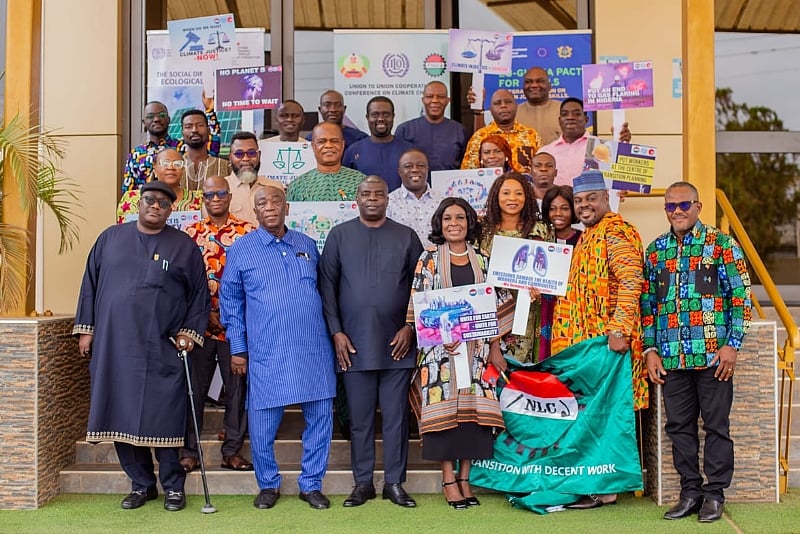In a landmark collaboration to address the challenges posed by climate change and the global energy transition, the Nigeria Labour Congress (NLC) and the Ghana Trades Union Congress (TUC) convened a joint workshop in Accra, Ghana, on Monday, July 7, 2025.
The three-day engagement seeks to consolidate union-to-union cooperation, foster dialogue, and ensure that emerging climate policies and the shift to green energy do not undermine the livelihoods of workers in both nations.
The workshop, organized in partnership with the International Labour Organization (ILO), is structured to promote knowledge sharing between the two major labour bodies. It aims to deepen understanding of the concept of Just Transition and to ensure workers are not left behind in the global response to the climate crisis. Throughout the sessions, technical discussions will be held on the future of work, climate-resilient economies, social dialogue, and policy engagement.
Addressing the gathering, the Secretary General of Ghana’s TUC, Mr. Joshua Ansah, emphasised the gravity of the climate emergency and its disproportionate impact on the working class across Africa. “The urgency of climate change is no longer up for debate,” he stated. “Across the continent and the globe, working people are already living with unpredictable weather patterns, food insecurity, and rising living costs all of which are intensifying existing inequalities.”
Mr. Ansah stressed that climate justice must go hand in hand with economic justice. “That is why the principle of Just Transition is so vital. Climate policies must not worsen existing inequalities or sacrifice workers’ rights in the name of progress,” he said.
He further warned that if unions are excluded from policymaking, the transition to a green economy could prove unjust and ineffective. “The fight against climate change will not be successful without the involvement of unions. It ultimately boils down to job losses and changes in the world of work. Unions must be involved in the formulation of policies to ensure that the right solutions are developed and implemented.”
He called for deeper engagement, noting that a just transition involves not only moving from fossil-based economies to sustainable systems but also understanding the socio-economic drivers of change. “A just transition is not just about moving from one level to another. It requires understanding the reasons behind the transition and being involved in the decision-making process. If workers are left out, the transition may not be just or meaningful,” Mr. Ansah concluded.
ILO Senior Specialist on Workers’ Activities, Ms. Inviolata Chinyangarara, described the joint initiative as a groundbreaking effort. She highlighted the importance of solidarity between African labour unions in shaping national and international climate agendas. “This conference is one of the pioneering events that the ILO is facilitating bringing together unions from Nigeria and Ghana to work jointly on climate and employment issues,” she said.
According to Ms. Chinyangarara, the ILO’s technical sessions over the next three days will focus on ILO policies regarding just transition and climate change. “We will also look closely at the role of social dialogue, especially in ensuring that unions play a key advocacy role when climate policy is being discussed at the national level,” she explained. She cautioned that failure to manage the transition carefully could result in job losses, increased poverty, and a deepening of inequalities, particularly in regions like West Africa where informal employment is prevalent.
“The shift to a climate-resilient economy affects workers in various ways. It touches on working conditions, international labour standards, and even the basic living conditions of people. This is why workers must be at the forefront of shaping the climate discourse.”
Speaking from the employer’s perspective, the Chief Executive of the Ghana Employers Association, Mr. Alex Frimpong, acknowledged that the transition could be a double-edged sword. While expressing optimism about the opportunities that lie within a green economy, he warned about the social consequences of a poorly managed shift. “If the transition is not managed well, it risks exacerbating existing inequalities and undermining decent work,” Mr. Frimpong said. “However, if handled properly, the energy transition holds immense promise, fostering innovation, green enterprise growth, and building resilient labour markets that can thrive in a new climate reality.”
Representing the Nigeria Labour Congress, the Chairman of its International Committee, Mr. Marwan Mustapha Adamu, emphasised that climate change is not an abstract concept but a concrete workplace issue. “Climate is largely a workplace reality. Workers, their families, and communities are at the direct line of fire when it comes to the impacts of climate change,” he said.
Mr. Adamu reiterated that climate adaptation and energy reform must be pursued through participatory models that include workers, unions, and employers. He stressed the importance of transnational collaboration, such as the ongoing NLC-TUC exchange, in building stronger, evidence-based responses to the crisis.
The workshop’s outcomes are expected to shape comprehensive action plans that will inform national policy engagement and advocacy in both Nigeria and Ghana. The ultimate goal is to ensure that Africa’s path to climate resilience and sustainable energy does not come at the cost of workers’ rights, decent employment, or social justice.


